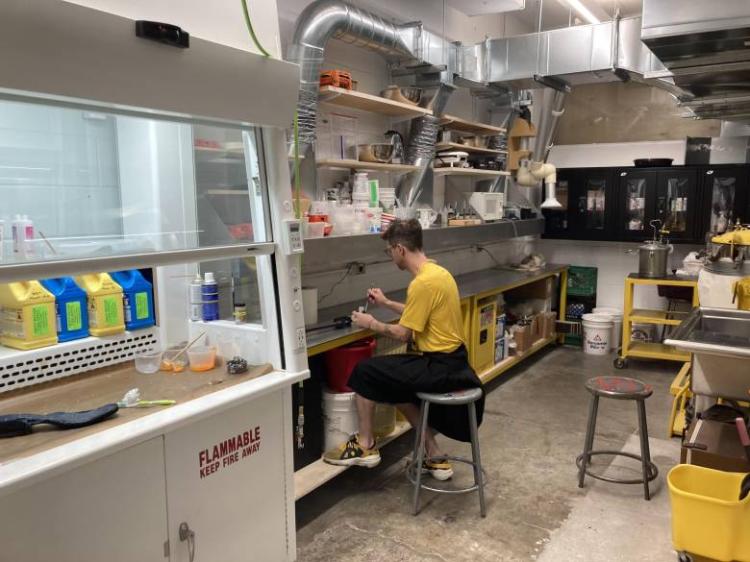Whether it's through fuel-switching or integrating eco-conscious practices into curriculum and research, OCAD University is making great strides to be an environmentally sustainable institution.
"From energy-efficient building improvements and green technologies to academic programs that weave in ecological responsibility, the University is creating a more sustainable future, both in practice, education and research," says Dr. Caroline Langill, OCAD U's Vice-President, Academic and Provost.

An improved heating, ventilation and air conditioning (HVAC) system was installed in the Plastics Studio, which is now enhancing the extraction and studio's capabilities. Photo courtesy of OCAD University.
Pursuing environmental sustainability is one of pillars of the University's Academic and Strategic Plan. In recent years, OCAD U has implemented several initiatives, including significant upgrades to campus buildings and curriculum changes that position sustainable practices at the core of student learning.
In fact, the University earned a STARS rating of Silver from the Association for the Advancement of Sustainability in Higher Education (AASHE) because of its achievements over the past three years.STARS, the Sustainability Tracking, Assessment & Rating System, measures and encourages sustainability in all aspects of higher education.
FACILITIES AND CAMPUS OPERATIONS
Progress so far:
- The University is in the preparation phase for fuel-switching - the process of replacing equipment that uses fossil fuel to heat air and water with electric-powered alternatives. This will help OCAD U achieve its goal of moving toward net zero by 2030;
- OCAD U is installing meters to monitor energy usage to better understand energy usage. The plan is to replace old fuel-burning equipment, including all the HVAC units on the rooftops with heat pumps. According to Nick Hooper, Director of Facilities and Studio Services, "the data from these meters will help the University identify what areas are most inefficient and then reduce energy usage through scheduling, modifications, or replacement of equipment;"
- Improved heating, ventilation and air conditioning (HVAC) in the Plastics and Jewelry Studios is now enhancing the extraction and studio capabilities so that any fumes or smoke from processes are more quickly and completely vented outside. This allows students to work with a wider range of materials in plastics and simplify the exhaust process in jewelry;
- Implementing energy efficiency measures has included replacing windows and upgrading inefficient equipment. For example, all the windows on the south side of the 100 McCaul St. building were replaced with energy-efficient ones in 2022. New high-efficiency water booster pumps for the Sharp Centre for Design are expected to save $10,000 annually in electricity and water;
- Energy-saving initiatives include retrofitting the lighting to LED. Over 60 per cent of all lighting on campus has been converted, including the Sharp Centre for Design, which was entirely retrofitted in the summer of 2024; and
- Repurposed furniture collected from around campus has been re-used for spaces, including a new student lounge at 100 McCaul St. Additionally, many of the bulletin boards being installed throughout 100 McCaul St. are using diverted waste from classroom construction projects. The University continues to operate its ReUse Depot for students, faculty and staff to up-cycle, re-purpose or reuse materials.
Sustainability champions for initiatives related to infrastructure, facilities and campus operations have included Alan Simms, Vice-President, Finance and Administration; members from the Facilities and Studio Services team: Christopher Darby, Manager, Facilities Maintenance; Douglas Free, Maintenance Assistant; Nick Hooper, Director, Facilities and Studio Services; Silvia Morgado, Assistant; and Gary Williams, Maintenance Assistance; and members from the Campus Planning and Projects team: Jason Corbin, Lead; and Tara Paashuis, Coordinator; and Dana Seguin, Manager, Campus Planning & Projects.
SUSTAINABLE PROCUREMENT INITIATIVE
OCAD U is a co-founder of a new Canada-wide university working group on sustainable procurement known as CASPAR that is working together to align their spending with sustainability objectives. This involves incorporating social and environmental considerations as part of their acquisitions of goods, services and construction works.
"At OCAD U, institutional procurement represents close to $20 million of spending annually, so this initiative is a tremendous opportunity to influence our institution's social, environmental and climate footprint," says Ana M. Piñeiro, OCAD U's Senior Procurement Officer and a co-founding member of the working group.
Piñeiro has been supported by Victoria, Ho, Advisor, Strategic Sustainability, on OCAD U's sustainable procurement strategy, including reviewing RFPs and evaluating sustainability criteria in vendor responses.
The CASPAR initiative grew out of a collaboration between procurement professionals from across the country, affiliated with the Canadian Association of University Business Officers (CAUBO). CASPAR stands for CAUBO-ACPAU-Sustainable Procurement-Approvisionnement Responsable.
"We have many suppliers in common, so it is a great opportunity for us to share strategies, common practices and results, which can support us in achieving our institutional sustainability goals," continues Pineiro. "We also face some of the same risks, such as threats to biodiversity or questionable labour practices in our respective supply chains. So, it makes sense to share best practices to mitigate these risks."
CASPAR members are working to bring all Canadian universities together on sustainable procurement, which could involve developing a common terminology language for sustainable procurement along with common tools such as standard contract clauses, benchmarking tools and shared key performance indicators.
INTEGRATING SUSTAINABILITY INTO THE CURRICULUM
In April 2024, the University's Senate approved a Sustainability Curriculum Strategy, which serves as the foundation for OCAD U in reaching its sustainability curriculum development goals. The five-year strategy aims to embed sustainability learning outcomes in over 80 per cent of curriculum by 2028.
The Sustainability Curriculum Strategy development and related programming was led by Victoria Ho, Advisor, Strategic Sustainability, in the Office of Diversity, Equity and Sustainability Initiatives (ODESI) and with the Faculty and Curriculum Development Centre, supported by significant collaboration with the Sustainability Committee, faculty, students and staff.
Progress so far:
- Offering a Sustainability Minor, introduced in 2015-16;
- Creating land-based learning experiences for students, grounded in the Indigenous Learning Outcomes and prioritizing land-based learning experiences for Indigenous students;
- Developing sustainability content in required first-year courses so students are introduced to sustainability approaches as part of their creative practice;
- Creating opportunities for students to learn about how their art and design material choices can impact local and global ecologies so they can improve these impacts. Two examples are the new Sustainable Colour Lab and the Life Studies Lab; and
- Providing on-campus experiential learning placements that integrate academic research and campus operations to test and implement solutions towards sustainability through a Campus As a Living Lab approach.
Additional related programming includes:
- The Sustainability Community of Practice, a monthly gathering that provides opportunities for faculty to discuss sustainability themes;
- The Sustainable Futures: Curriculum Series, which offers workshops and webinars to showcase tangible sustainability approaches;
- The 2023-24 Sustainable Futures Faculty Fellowship program, which advanced research on innovative pedagogical approaches to sustainability; and
- Identifying courses with a specific focus on sustainability to be included in the Course Catalogue. Currently, 13 academic programs list at least one sustainability-focused course.













